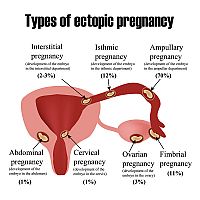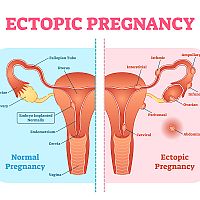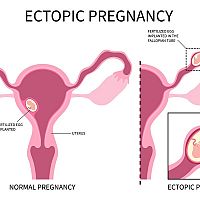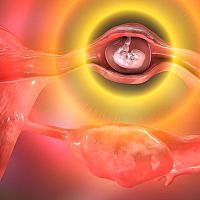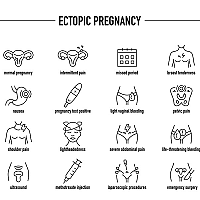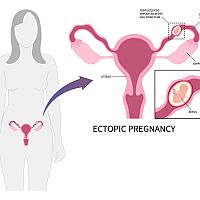
Ectopic pregnancy - symptoms, experiences, hCG values and termination
A report from a doctor that a pregnant woman has an extrauterine pregnancy (ectopic pregnancy) is never positive. These are circumstances that need to be dealt with urgently, because it can be a life-threatening condition for a woman. The reason for an ectopic pregnancy is that the fertilized egg did not descend into the uterus, but implanted outside it. The embryo cannot develop and survive outside the uterus. The cause of an ectopic pregnancy is never exactly known, although in some cases the risk of an ectopic pregnancy is higher. How is an ectopic pregnancy detected? What are the symptoms, causes and treatment of ectopic pregnancy? Does ectopic pregnancy affect only women over 35?
- What is an ectopic pregnancy?
- Ectopic pregnancy - symptoms and course
- How is an ectopic pregnancy detected?
- Occurrence of ectopic pregnancy - causes
- Surgery - procedure to terminate pregnancy and treatment
- Another pregnancy after an ectopic pregnancy
- Ectopic pregnancy - experiences
- The most frequent questions - FAQ
- Comments
Under normal circumstances, pregnancy results from the fertilization of a woman's mature egg by a man's dominant sperm. This fertilized egg travels through the fallopian tubes to the uterus, where it implants and begins a standard pregnancy with all the specifics and special features. In the case of an ectopic pregnancy, however, the egg never reaches the uterus and implants itself outside of it. Compared to the data from 1970, the frequency of ectopic pregnancy increased sixfold. The risk of ectopic pregnancy is most recently reported at a ratio of 1:80 (previous data indicated a ratio of 1:200). The saddest thing is that such a condition leads to termination of pregnancy or spontaneous death of the embryo. A further increase in ectopic pregnancy cases is expected in the future.
What is an ectopic pregnancy?
Ectopic pregnancy, also called ectopic or extrauterine pregnancy, is a serious condition that requires a diagnostic solution and a doctor's intervention due to the risk of endangering the health of the woman. It is a pathological condition that predisposes the pregnancy to failure. The reason is that the fertilized egg settles in a different place during transport - migration to the uterus. In this case, it is not possible for the pregnancy to proceed normally, because the egg cannot develop properly.
In most cases of ectopic pregnancy, the egg implants in the fallopian tubes (tubal pregnancy). It is possible that the egg will nest in another place, but this represents a high risk in all circumstances. In a smaller number of cases, it can also be an ovarian pregnancy, when implantation takes place at the level of the ovary, or a cervical pregnancy, when the egg implants on the outer wall of the cervix.
A very serious condition is if the egg is expelled into the abdominal cavity and the so-called abdominal pregnancy. In this case, the fallopian tube ruptures, which causes weaker or stronger bleeding and intense pain in the lower abdomen. However, if the egg ejected into the abdominal cavity survives, it continues to develop there, and this poses a high risk to the health and life of the woman. If a rupture occurs, it is usually manifested by heavier bleeding and pain in the lower abdomen. The pregnancy in this phase ends roughly around the 6th to 8th week.
An ectopic pregnancy, depending on the specific circumstances and location of the placement, can last for a different length of time. The death of the egg often occurs because it is not in a sufficiently hospitable environment and is not supplied with blood. In most cases, based on the course and symptoms, no ectopic pregnancy lasts longer than the end of the 1st trimester. However, cases are very individual. Early diagnosis is important, which reduces the risk of further complications even in the case of future pregnancies. Although the risk of recurrence of an ectopic pregnancy increases after its occurrence, pregnancy is still possible.

Ectopic pregnancy - symptoms and course
The biggest ailment of this type of unwanted pregnancy is that its symptoms are often very similar to those of a classic pregnancy. Above all, the first symptoms, such as a missed period, morning sickness or sensitive breasts, are indistinguishable from the symptoms of classic pregnancy. The first more authoritative warning signal is brownish to dark red discharge from the vagina - weak bleeding (contains old blood) and pain in the lower abdomen reminiscent of menstrual cramps. The pain can intensify up to the form of sharp cramps. The reason may even be a rupture of the fallopian tube, which is often accompanied by profuse bleeding. Bleeding into the abdominal cavity is risky, which can cause fatal consequences.
More serious signs of ectopic pregnancy should be monitored between the 5th and 8th week, and in the event of their occurrence, an immediate visit to the gynecologist is necessary, as the condition may require surgical intervention. There are frequent cases in which an ectopic pregnancy disappears spontaneously at an early stage and the woman may not even know about it. This happens if the fertilized egg implants in a place where it is not sufficiently supplied with blood and simply dies. The opposite is the case if it nestles and develops in the fallopian tube, which bursts under the pressure of the growing egg and, after being expelled into the abdominal cavity, a tubal abortion occurs. Miscarriage can also occur due to chronic inflammation, which causes the egg to die while still in the fallopian tube.
In the case of an abdominal pregnancy (egg ejected into the abdominal cavity), the egg lodges near the organs where it develops and bleeds into the abdominal cavity. During development, the egg can hit the wall of the organ and thus obtain the necessary supply of nutrients from the blood. Bleeding occurs due to disruption of blood vessels. As we mentioned above, this is a high-risk condition for a woman due to the possible occurrence of massive bleeding.
We consider it important to point out that the course of an ectopic pregnancy, as well as accompanying symptoms, can manifest themselves very specifically in the case of each woman. It also depends on the pathology of the pregnancy itself. Therefore, regular visits to a gynecologist are important, as he is the only one who can carry out a professional diagnosis and determine an appropriate solution.

How is an ectopic pregnancy detected?
Of course, the symptoms mentioned above can also indicate that an ectopic pregnancy is taking place in the woman's body. However, it is not a guarantee. The only guaranteed way to confirm the progress of such a pregnancy is an examination by a doctor. The most appropriate way to detect an ectopic pregnancy is an ultrasound. This is the most accurate way to clearly determine whether the fertilized egg is in the uterus or has implanted outside of it. Usually, such a diagnosis is possible around the 4th-5th week of pregnancy.
Laboratory measurement of the hCG hormone level in the blood and urine of a woman can also be authoritative. A urine test is not as accurate. Doctors know the values of the hCG hormone level in the blood, which are typical for a given week of pregnancy. In the case of an ectopic pregnancy, the level of this hormone increases only minimally compared to a classic pregnancy. The level even tends to decrease. Experienced gynecologists can already detect the possible risk of ectopic pregnancy during a gynecological examination, precisely by increased sensitivity in the lower abdomen. The structure of the uterus or the visual of the space between the vagina and the anus, which may be slightly arched, can also indicate the presence of blood in the abdominal cavity, which also reaches these places.
A pregnancy test cannot detect an ectopic pregnancy. Due to the increase in the hCG hormone level, the pregnancy test may show a positive result, but it cannot determine whether the egg is located outside the uterus or not. You can try to repeat the pregnancy test, a negative test could indicate that the hCG level has dropped. In any case, it is advisable to visit a gynecologist.

Occurrence of ectopic pregnancy - causes
Why does this pathological condition occur? For what reason is the migration of the fertilized egg into the uterus not successful? Based on data and statistics, the causes of ectopic pregnancy can be different. The downside is that the number of cases is rising. A higher risk of ectopic pregnancy in women is, for example, in the following cases:
- congenital developmental abnormalities and anomalies of the genitals – poorer patency of the fallopian tubes, fallopian tube function disorders, fallopian tube motility disorder and others,
- occurrence of ectopic pregnancy in previous pregnancies,
- the occurrence of inflammation or infection in the fallopian tubes and genitals during the migration of the fertilized egg into the uterus,
- more frequent inflammations or the occurrence of sexually transmitted diseases that occurred before pregnancy and could cause deformation or changes in the mucous membrane, obstruction or narrowing of the fallopian tubes,
- inflammatory diseases of the pelvis,
- fallopian tube diseases (e.g. endometriosis),
- applying one of the methods of assisted reproduction,
- pregnant women over the age of 35 (risk age),
- women who had an intrauterine device (IUD) inserted (a form of contraception),
- post-operative conditions related to the uterus or genitalia, where post-operative adhesions may affect the transport ability of the fallopian tubes,
- regular smoking.
Despite the fact that statistically certain risk groups exist and some factors are known that are behind the increased probability of ectopic pregnancy, there is no effective prevention. This pathological condition of pregnancy affects not only first-time mothers, but also women who have already given birth and even multiple times. However, it is still not possible to determine exactly how to prevent or minimize the risks associated with the occurrence of an ectopic pregnancy.

Surgery - procedure to terminate pregnancy and treatment
Treatments and procedures can vary greatly due to accompanying symptoms, diagnoses, or the severity of the condition. First, a precise examination by a doctor is important. He must be able to determine where the fertilized egg was implanted. If an intervention is necessary, a surgical operation is performed. Early diagnosis of ectopic pregnancy minimizes the risk of further complications.
Surgery is the most common form of therapy given the stage at which an ectopic pregnancy is diagnosed. Not to mention the cases when there is bleeding in the abdominal cavity and urgent surgery is required. Surgical termination of ectopic pregnancy is carried out by laparoscopy, which is a less invasive method. Laparoscopically, it is possible to expel the fetal egg, cut the fallopian tube or even remove it completely. Removal of the fallopian tube - salpingectomy is performed only if the doctor assesses that the fertilized egg has damaged the fallopian tube so much that it cannot fulfill its role in the woman's body. Getting pregnant and having a healthy pregnancy even with one fallopian tube is still possible. However, it is recommended to wait at least 6 months before the next natural fertilization.
Major surgical interventions are only necessary in a fraction of cases, in which case the opening of the abdominal cavity is necessary to remove the fallopian tube or even the ovary. There is also the possibility of alternative medicinal treatment. If an ectopic pregnancy is detected in time, there are medications that can be given and their effect will ensure the absorption of the egg. It is important to observe the woman in the hospital. The advantage is that there will be no invasive intervention in the woman's body. In the early stages of pregnancy, it is possible to consider transferring the embryo to the uterus. This procedure is performed in a minimal number of cases, also because its success rate is relatively low.

Another pregnancy after an ectopic pregnancy
The possibility of becoming pregnant after an ectopic pregnancy is available to every woman who, even in the case of surgery, has at least one functional fallopian tube left. Individual cases differ from each other specifically and also depend on other circumstances. Women who have had an ectopic pregnancy have a higher risk of it happening again. However, getting pregnant naturally is possible. Doctors recommend taking a break, ideally at least 6 months after the operation, when trying to get pregnant again. If the operation was not necessary, keep a gap of at least 3-4 months before trying to conceive again. Women who have survived an ectopic pregnancy are considered at risk with each subsequent pregnancy and are closely monitored.
Ectopic pregnancy - experiences
The experiences of women with ectopic pregnancy are very different. Most often, women deal with manifestations - symptoms of ectopic pregnancy in discussions. Several women report spotting from the vagina and also persistent pains reminiscent of menstrual cramps localized in one place. Many women recommend, in case of ambiguity with early diagnosis, to wait at least until the 5th week of pregnancy and contact a gynecologist so that possible treatment can be determined in time. Unfortunately, experiences with ectopic pregnancy have also caused the need for removal of the fallopian tubes or their non-passage in some women
The most frequent questions - FAQ
Is ectopic pregnancy a topic that concerns you? Are you interested in what ectopic pregnancy is and what are its causes? Do you want to know how to detect an ectopic pregnancy? You will find all the important information in our article. If you have further questions, do not hesitate to write to us or ask in the comments below the article. If you have a personal experience with an ectopic pregnancy, we will be happy if you share your experience in the discussion.
When is an ectopic pregnancy manifested?
What is an ectopic pregnancy?
How long can an ectopic pregnancy last?
How is an ectopic pregnancy detected?
Can I have a baby after an ectopic pregnancy?
Gallery
Pridať komentár

